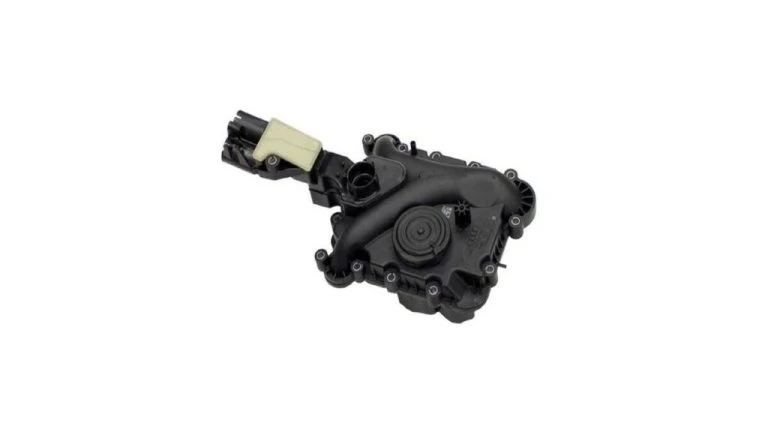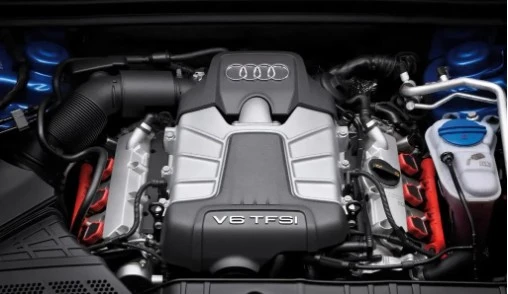The Audi 3.0 TFSI Series has captured the hearts of car enthusiasts around the world with its blend of power, efficiency, and cutting-edge engineering. Renowned for its superchargers and later turbochargers, this engine series represents the pinnacle of Audi’s commitment to delivering exceptional driving experiences.
However, like any complex machinery, these engines are not immune to issues, and one significant concern that has garnered attention is the PCV (Positive Crankcase Ventilation) failure issue. In this blog post, we’ll try to explain what’s going with PCV systems on these engines and help you be more prepared if your PCV starts giving you trouble. Understanding the PCV failure issue is vital for maintaining the performance that Audi’s 3.0 TFSI series is known for.

Understanding the Audi 3.0 TFSI Engine
The Audi 3.0 TFSI engine stands as a testament to Audi’s engineering prowess, delivering an optimal balance between power and efficiency. Boasting a V6 configuration, this engine incorporates advanced technologies to provide an exhilarating driving experience. With direct fuel injection and a supercharger (the version we’re talking about today), it maximizes power output while minimizing fuel consumption, creating a harmonious blend of performance and sustainability.
The heart of the 3.0 TFSI engine lies in its supercharging technology, which forces more air into the combustion chambers, resulting in increased power without the need for a larger engine. This enables impressive acceleration and dynamic performance, making the Audi 3.0 TFSI-equipped vehicles a joy to drive. Moreover, the direct fuel injection system precisely delivers fuel to the cylinders, enhancing efficiency and reducing emissions.
In addition to its performance capabilities, the Audi 3.0 TFSI engine’s design includes features like variable valve timing and advanced engine management systems, contributing to its refined operation and responsiveness. These factors combined have made the 3.0 TFSI engine a centerpiece of Audi’s lineup, providing drivers with an engaging driving experience.
While the Audi 3.0 TFSI engine showcases numerous technological advancements, it’s crucial to acknowledge that even the most sophisticated engines can encounter issues over time. One such concern that has surfaced in the realm of Audi 3.0 TFSI ownership is the PCV (Positive Crankcase Ventilation) failure issue, which can have implications on the engine’s performance and longevity.
What is PCV and Its Role in Engines?
The PCV (Positive Crankcase Ventilation) system is a crucial component in modern internal combustion engines, including the Audi 3.0 TFSI series. Its primary role is to manage and regulate the pressure and gases that build up within the engine’s crankcase during the combustion process.
As an engine operates, a mixture of air, fuel, and combustion byproducts enters the combustion chamber to produce power. However, not all of this mixture is burned completely, and some of it leaks past the piston rings into the crankcase. Over time, this unburned mixture combines with the engine oil, leading to contamination and the formation of harmful carbon deposits.
The PCV system addresses this issue by creating a controlled flow of fresh air from the intake manifold into the crankcase. This fresh air helps dilute the contaminated gases and vapors, preventing excessive pressure buildup within the crankcase. The mixture of air and vapors is then directed back into the intake manifold to be burned off during combustion, reducing emissions and maintaining engine efficiency.
By regulating the pressure and gases in the crankcase, the PCV system plays a vital role in preventing oil leaks, maintaining proper engine lubrication, and minimizing the production of harmful emissions. Without a functioning PCV system, an engine can experience a range of problems, including increased oil consumption, decreased fuel efficiency, rough idling, and even potential damage to engine components.
Identifying the PCV Failure Issue
Recognizing the signs of a failing PCV (Positive Crankcase Ventilation) system in an Audi 3.0 TFSI engine is essential for maintaining its optimal performance and preventing further damage. Several symptoms can indicate that the PCV system is experiencing issues:
- Increased Oil Consumption — A failing PCV system can lead to increased oil consumption, as the contaminated gases and vapors can dilute the engine oil, reducing its effectiveness in lubricating the engine components.
- Oil Leaks — Pressure buildup caused by a malfunctioning PCV system can lead to oil leaks around gaskets and seals. These leaks can result in unsightly oil spots under the vehicle and may also contribute to decreased engine performance.
- Rough Idling — A compromised PCV system can disrupt the engine’s air-fuel mixture, causing the engine to idle roughly or inconsistently. This can result in vibrations and an overall uncomfortable driving experience.
- Loss of Engine Power— Since the PCV system helps maintain proper combustion by regulating pressure and gases, a failure can lead to decreased engine power and responsiveness.
- Excessive Exhaust Smoke — A failing PCV system can cause an abnormal amount of blue or gray smoke to emit from the exhaust. This is often a sign of oil burning in the combustion chamber.
- Whistling Sound— When the diaphragm fails, it causes a condition where the PCV valve starts to whistle when you drive the car. This noise can get loud if left unchecked long enough
- Oil Contamination— Depending on the type of PCV system failure you experience, you could end up with oil coolant in your engine oil. Needless to say, this is a very dangerous situation where you’re risking severe engine damage.
Check Engine Light
A malfunctioning PCV system can trigger the vehicle’s onboard diagnostics system, leading to the illumination of the check engine light on the dashboard. You’ll likely find one, or more of the following codes:
- P0171 – System Too Lean (Bank 1)
- P0172 – System Too Rich (Bank 1)
- P0174 – System Too Lean (Bank 2)
- P0175 – System Too Rich (Bank 2)
- P0507 – Idle Air Control System RPM Higher than Expected
- P2187 – System Too Lean at Idle (Bank 1)
Causes of PCV Failure in Audi 3.0 TFSI Engines
For years, Audi and VW have had issues with their PCV system designs. So much so that PCV failure is something most VW owners have to deal with, especially if they own high mileage cars. The main point of failure is the notorious diaphragm inside the valve assembly that is known to tear. On top of this, the check valve can also fail, becoming stuck and preventing the PCV system from working at all.
Implications of Ignoring the Issue

Ignoring a PCV (Positive Crankcase Ventilation) failure issue in an Audi 3.0 TFSI engine can have far-reaching consequences that extend beyond just the PCV system itself. Failing to address this issue can lead to a cascade of problems that affect the overall performance, reliability, and maintenance costs of the vehicle.
- Increased Engine Wear— A malfunctioning PCV system can cause increased pressure within the crankcase, leading to oil leaks and reduced lubrication efficiency. This, in turn, can accelerate wear and tear on vital engine components such as pistons, rings, and bearings.
- Decreased Fuel Efficiency— The compromised PCV system can disrupt the proper air-fuel mixture, resulting in incomplete combustion and reduced fuel efficiency. This can lead to more frequent visits to the fuel pump and higher operating costs.
- Elevated Emissions — The PCV system plays a role in managing emissions by recirculating harmful gases back into the combustion process. A failure can lead to increased emissions, potentially causing the vehicle to fail emissions tests and contributing to environmental pollution.
- Catalytic Converter Damage— Excessive oil consumption due to a malfunctioning PCV system can lead to oil contamination in the exhaust system. This can damage the catalytic converter, a critical emissions control component, resulting in expensive repairs.
- Higher Maintenance Costs— Ignoring the PCV issue can lead to more severe engine problems that require costly repairs or even engine replacement. Addressing the issue early on through proper maintenance can help prevent these significant expenses.
- Unreliable Performance — As the engine’s performance deteriorates due to PCV failure, drivers may experience reduced acceleration, rough idling, and decreased overall driving satisfaction.
Technical Solutions and Repairs
When faced with a PCV (Positive Crankcase Ventilation) failure issue in their Audi 3.0 TFSI engine, owners have several options for addressing the problem. The appropriate course of action depends on the severity of the issue and the owner’s comfort level with DIY repairs.
We say this because replacing a PCV valve on a supercharged Audi 3.0 TFSI engine is no easy feat. Unlike the EA888 2.0 TFSI, where you can fairly easily reach the PCV assembly, the one on the 3.0 TFSI is located under the supercharger. That means you’ll need to first remove the supercharger and the intake flaps before you can even see the PCV assembly, let alone replace it. We will do a detailed guide on this procedure at a later date.
Ensuring the Longevity of Your Audi 3.0 TFSI Engine
To ensure the longevity and optimal performance of your Audi 3.0 TFSI engine, proactive measures are essential. Regular maintenance, using high-quality engine oil, and adhering to recommended driving habits, can go a long way in preventing PCV failure.
That said, if you own a high mileage Audi 3.0 TFSI engine, we highly recommend that you replace the PCV if you’re doing repairs on your supercharger. Or, to simply replace it ahead of time as it’s not really a matter of if the PCV system will fail on your car, but when. Find all the parts that you need in our store! Simply select your vehicle, and you’ll be shown a list of Audi parts that are a guaranteed fit!

